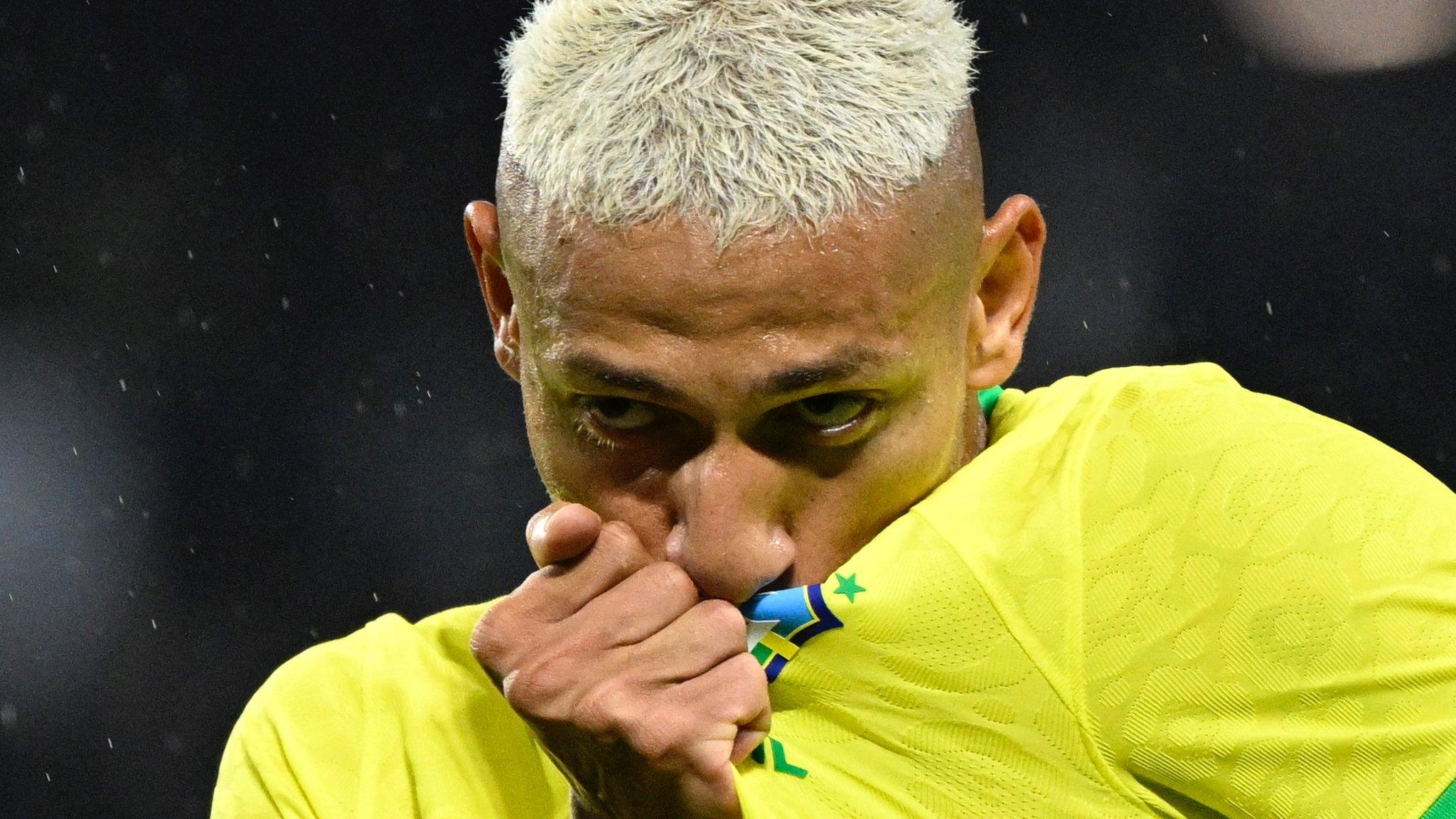Brazil Congress: Lula vows to punish supporters of Bolsonaro after riot
- Published
January 2023: Key moments as Bolsonaro supporters storm Brazil government buildings
Brazil's President Luiz Inácio Lula da Silva has vowed to punish supporters of the country's ex-leader, Jair Bolsonaro, after they stormed Congress.
Supporters of the ousted far-right leader also stormed the Supreme Court and surrounded the presidential palace.
But police regained control of the buildings in the capital Brasilia on Sunday evening after hours of clashes.
Brasilia's Civil Police said 300 people have been arrested and officials have vowed to track down others involved.
The justice minister, Flavio Dino, has said the government is seeking information on "terrorist attacks".
On Monday morning, heavily armed officers in the city gathered outside a camp of Mr Bolsonaro's supporters - one of a number that have been set up outside army barracks around the country since October's election.
Meanwhile, Brasilia's governor, Ibaneis Rocha, has been removed from his post for 90 days by the Supreme Court.
Justice Alexandre de Moraes accused him of failing to prevent the riot and of being "painfully silent" in the face of the attack. Mr Rocha has apologised for Sunday's events.
Pro-democracy rallies are being called by leftist leaders and groups across Brazil.
The dramatic scenes - which saw thousands of protesters clad in yellow Brazil football shirts and flags overrun police and ransack the heart of the Brazilian state - come just a week after Lula's inauguration.
He toured the Supreme Court building on Sunday night to see the damage for himself.
The veteran left-wing leader was forced to declare emergency powers before dispatching the national guard into the capital to restore order.
He also ordered the closure of the centre of the capital - including the main avenue where governmental buildings are - for 24 hours.
Brazilian President Lula says Congress invaders will be punished
Mr Dino said some 40 buses which had been used to transport protesters to the capital had been seized and he called the invasion an "absurd attempt to impose [the protesters'] will by force".
Mr Bolsonaro has repeatedly refused to accept that he lost October's election and last week left the country instead of taking part in inaugural ceremonies, which would have seen him hand over the iconic presidential sash.
The 67-year-old - who is believed to be in Florida - condemned the attack and denied responsibility for encouraging the rioters in a post on Twitter some six hours after violence broke out.
Speaking before he arrived in Brasilia, Lula said there was "no precedent in the history of our country" for the scenes in Brasilia and called the violence the "acts of vandals and fascists".
And he took aim at security forces whom he accused of "incompetence, bad faith or malice" for failing to stop demonstrators accessing Congress.
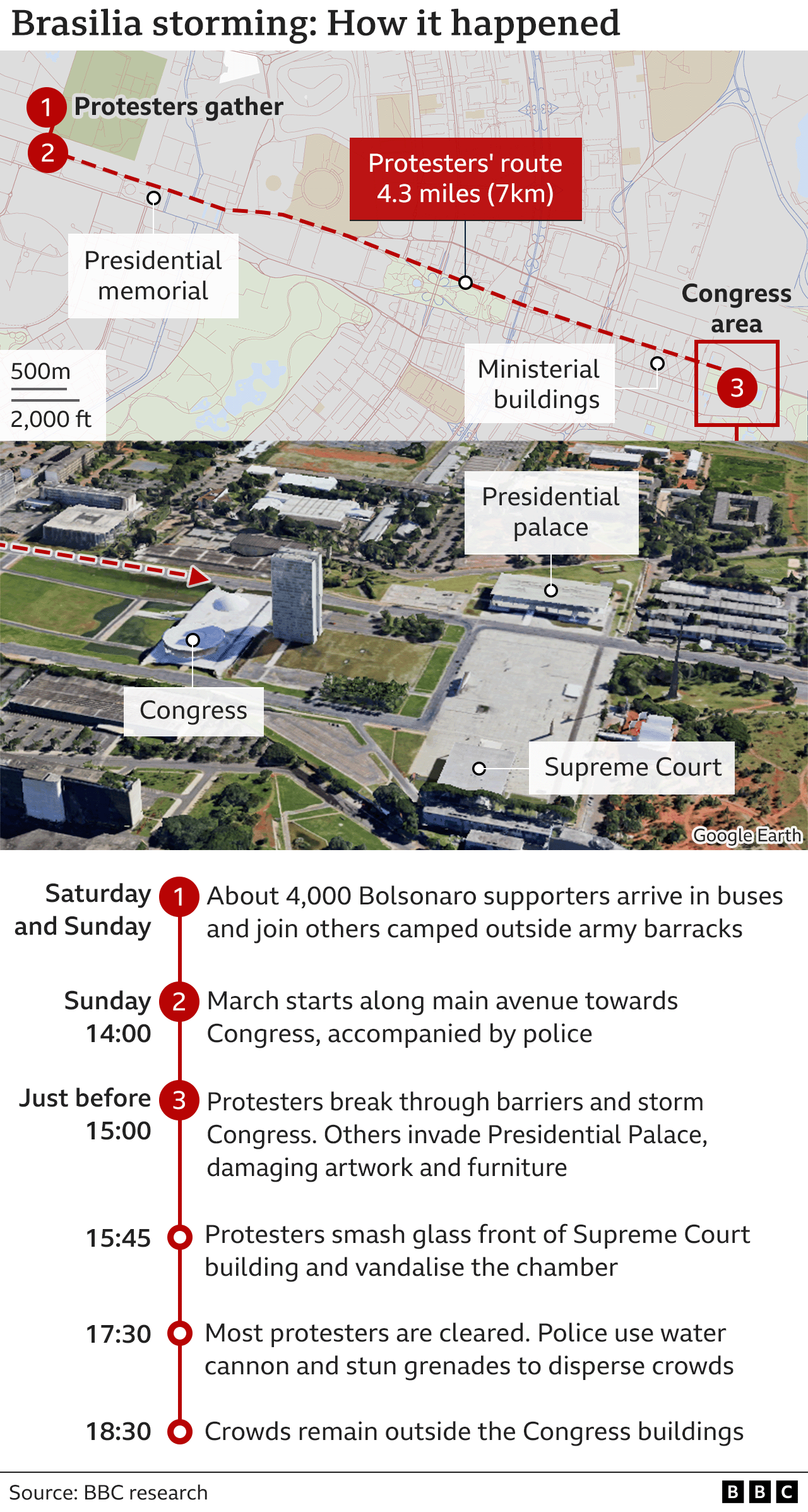
"You will see in the images that they [police officers] are guiding people on the walk to Praca dos Tres Powers," he said. "We are going to find out who the financiers of these vandals who went to Brasilia are and they will all pay with the force of law."
Video shared by the Brazilian outlet O Globo showed some officers laughing and taking photos together as demonstrators occupied the congressional campus in the background.
Some protesters smashed windows, while others reached the Senate chamber, where they jumped on to seats and used benches as slides.
Videos on social media show protesters pulling a police officer from his horse and attacking him outside the building.
Footage broadcast by national media show police detaining dozens of protesters in their yellow jerseys outside the presidential palace.
Other suspects - whose hands were bound behind their backs - are also seen being led out of the building.
Protesters had been gathering since the morning on the lawns in front of the parliament and up and down the kilometre of the Esplanada avenue, which is lined with government ministries and national monuments.
Despite the actions of the protesters, in the hours before the chaos, security had appeared tight, with the roads closed for about a block around the parliament area and armed police pairs guarding every entrance into the area.
The BBC had seen about 50 police officers around on Sunday morning local time and cars were turned away at entry points, while those entering on foot were frisked by police checking bags.
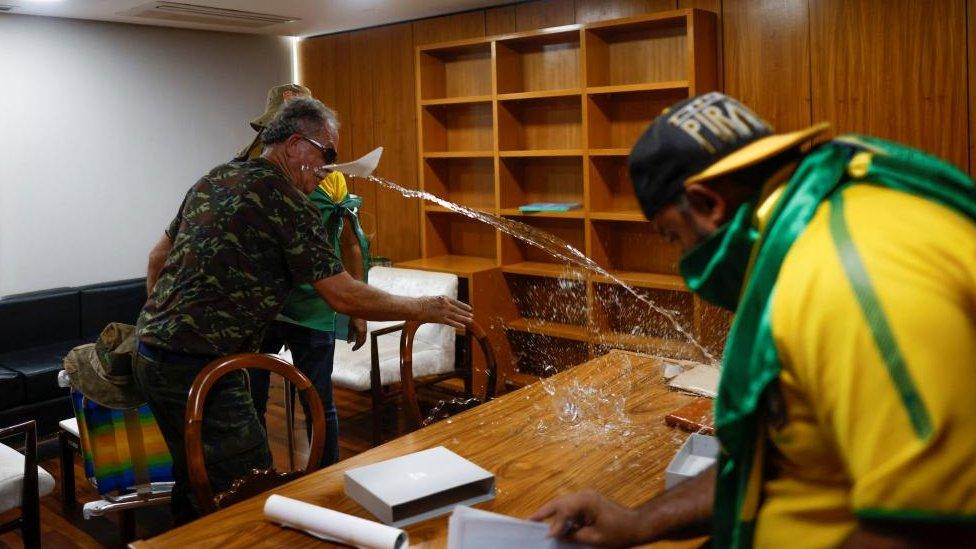
Vandals inside a room in the presidential palace
Demonstrators were quick to defend their actions when approached by reporters.
Lima, a 27-year-old production engineer, said: "We need to re-establish order after this fraudulent election."
"I'm here for history, for my daughters," she told AFP news agency.
Others in the capital expressed outrage at the violence and said the attack marked a sad day for the country.
"I voted for Bolsanaro but I don't agree with what they're doing," Daniel Lacerda, 21, told the BBC. "If you don't agree with the president you should just say it and move on, you shouldn't go hold protests and commit all the violence like they're doing."
And many are drawing comparisons with the storming of the US Capitol on 6 January 2021 by supporters of Donald Trump, an ally of Mr Bolsonaro.
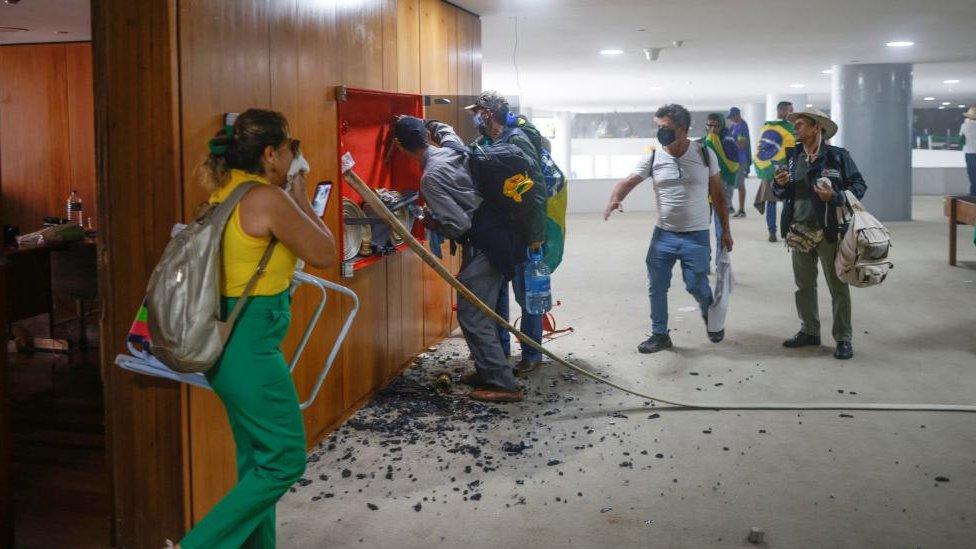
Bolsonaro supporters vandalising the interior of the presidential palace
Bolsonaro supporters created camps in cities across Brazil, some of them outside the military barracks. That is because his most ardent supporters want the military to intervene and make good elections that they say were stolen.
It looked like their movement had been curbed by Lula's inauguration - the camps in Brasilia had been dismantled and there was no disruption on the day he was sworn in.
But Sunday's scenes show that those predictions were premature.
According to Katy Watson, the BBC's South America correspondent, some protesters aren't just angry that Jair Bolsonaro lost the election - they want President Lula to return to prison.
He spent 18 months in jail after being found guilty of corruption in 2017. His convictions were later annulled, after initially being sentenced to more than nine years.
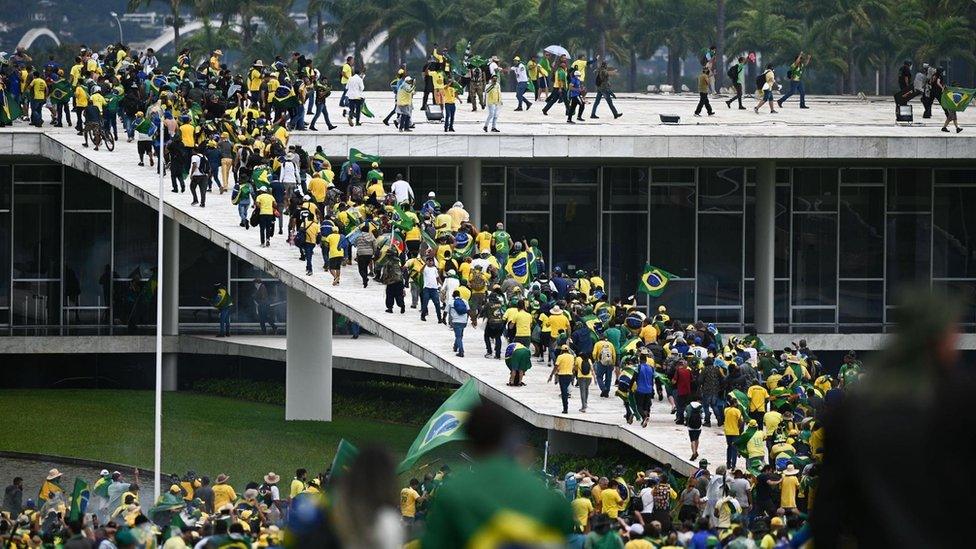
Police used tear gas in an attempt to repel protesters
Leaders from Latin America have condemned the violence. Colombian President Gustavo Petro said "fascism [had] decided to stage a coup" while Colombia and Mexico have offered their full support to President Lula.
These sentiments have been echoed in other countries. US President Joe Biden said he condemned "the assault on democracy and on the peaceful transfer of power in Brazil", while Germany's Chancellor Olaf Scholz said the "attack on democracy...cannot be tolerated".
The UK, China and Turkey are among other countries that have also condemned the rioters' actions.
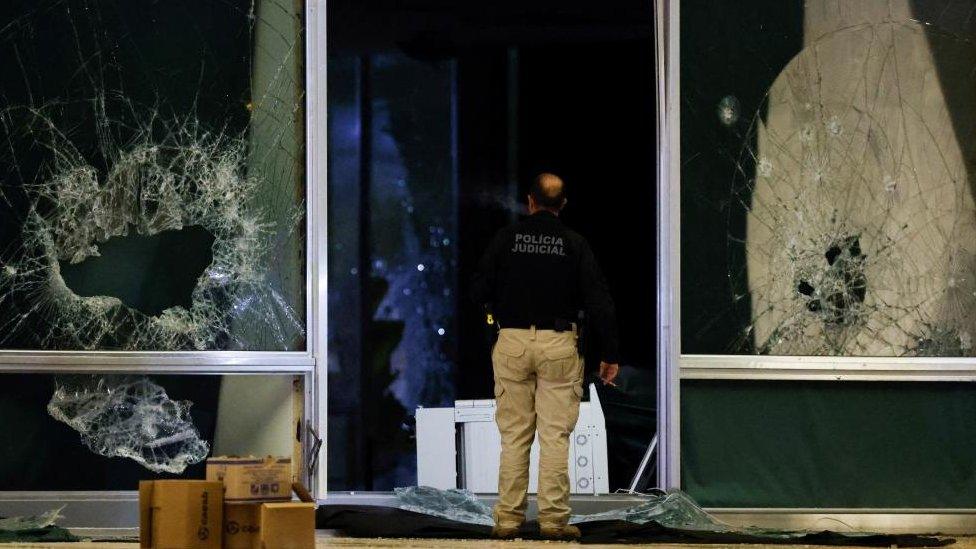
A police officer inspects damage at the Supreme Court
Related topics
- Published1 January 2023
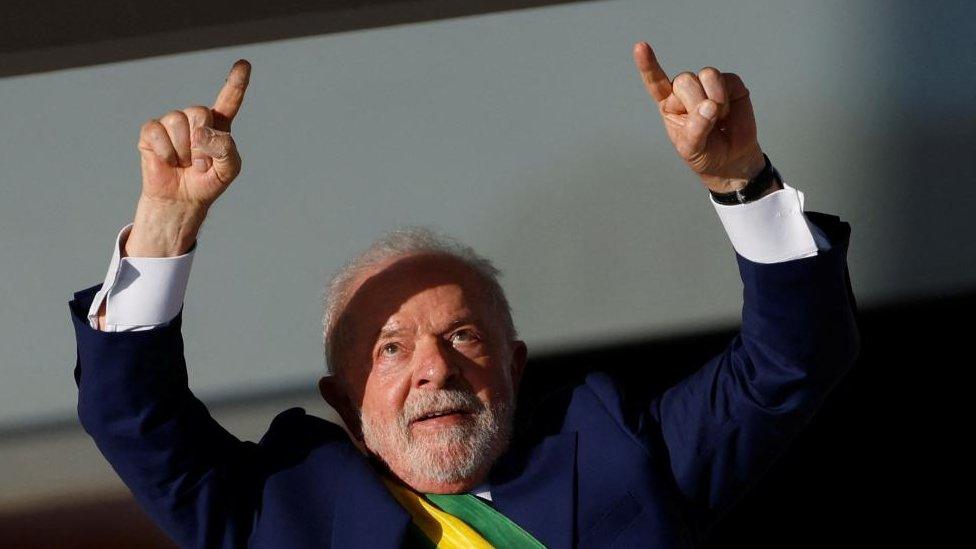
- Published26 December 2022
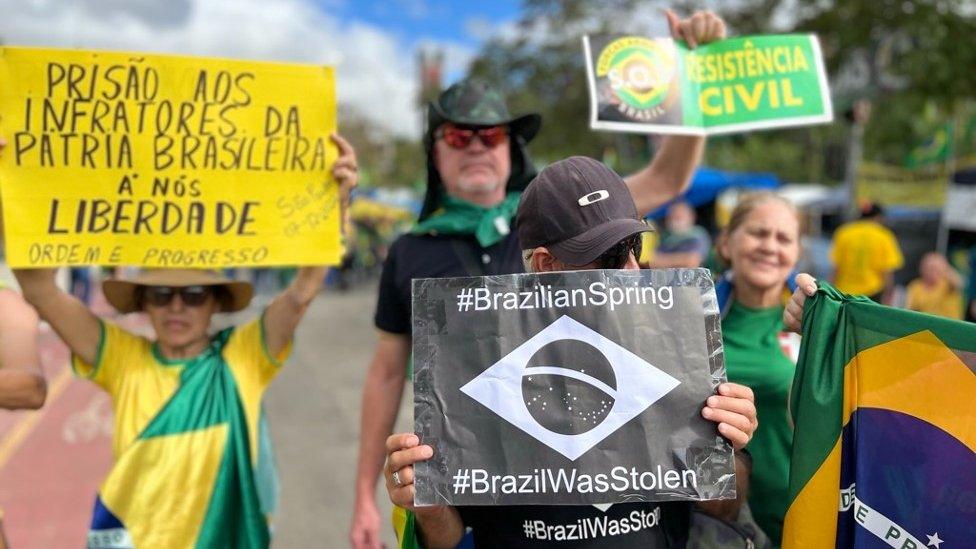
- Attribution
- Published30 September 2022
